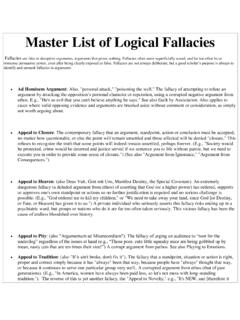Transcription of WHY LYING IS ALWAYS WRONG: THE UNIQUENESS OF …
1 WTJ 75 (2013): 83-95 WHY LYING IS ALWAYS WRONG: THE UNIQUENESS OF VERBAL DECEITVern S. PoythressI think it is ALWAYS wrong to lie (to state what one knows is not true). But my friend John Frame and a number o f other theologians make exceptions in extreme cases, such as in war and to save life. The debate includes the classic moral dilemma that arises in the case where Nazi soldiers com e to your door, asking whether you are hiding Wayne Grudem argued in favor o f never LYING in the festschift to John Frame; and Frame responded briefly in the same This exchange builds on earlier work byjohn Murray and John Taken together, these writings lay out the arguments on both sides. Neither side has succeeded in pre- senting an argument that would convince everyone on the other side. Frame indicates that he has gone back and forth several times 3 on the issue, which illustrates the difficulty.
2 Is there anything more to be said?The arguments in favor o f LYING in exceptional cases include three prongs, which focus respectively on normative, existential, and situational aspects o f the issue. I myself think that together these prongs have plausibility. Like Wayne Grudem, I want to stress that I respect John Frame and others who allow excep- tions. And yet they have not convinced me. Why not?I. Scriptural InstructionThe normative prong in favor o f exceptions includes positive instances o f deceit in Scripture, and the negative observation that nowhere does Scripture directly and clearly prohibit all LYING whatsoever. Cases o f LYING naturally fallVern S. Poythress is Professor o f New Testament In terpretation a t Westminster Theological Wayne A. Grudem, Why It Is Never Right to Lie: An Example o f Joh n Frame s Influence on My Approach to Ethics, in Speaking the Truth in Love: The Theology of John M.
3 Frame (ed. John J. Hughes; Phillipsburg, NJ.: Presbyterian & Reformed, 2009), 778-801 ;John F ram e s response is found in Responses to Som e Articles, in Speaking the Truth in Lave, John Murray, Principles of Conduct (Grand Rapids: Eerdmans, 1957), 123-48; J o h n M. Frame, The Doctrine o f the Christian Life (Phillipsburg, : Presbyterian & Reformed, 2008), 830-43. The discussion o f possible e x cep tio n s is fo u n d in ibid., 834-40. A ugustine and Calvin are earlier representatives o f Grudem s position, which is similar to John Murray Frame, Responses, THEOLOGICAL JOURNAL84under the Ninth Commandment, which says, You shall not bear false witness against your neighbor (Exod 20:16). At its heart the Ninth Commandment focuses on false testimony in court, which is clearly a situation where telling only the truth is mandated.
4 But what about the many other situations in which we find ourselves? Ephesians 4:25 says, Let each one o f you speak the truth with his neighbor, for we are members o ne o f another. This com m andm ent is much broader in scope, but still focuses on fellow Christians, who are mem- bers one o f another. Other verses are more general: You destroy those who speak lies (Ps 5:6); LYING lips are an abomination to the Lord (Prov 12:22). Grudem lists many other verses that condem n LYING ,4 but his opponents may argue that these verses address the same situations covered by the Ninth Com- m andm ent and Eph 4:25. That is, they concern saying things that help rather than hurt our , concern for truth extends beyond the needs o f neighbors. God is a God o f truth. Truth is central to G od s character, as well as to his communication with us.
5 God never lies (Titus 1:2; cf. Num 23:19). Christ is the truth (John 14:6). God s word is truth (John 17:17). In addition, we are to be imitators o f God and imitators o f Christ (Eph 5:1; 1 Cor. 11:1; 1 Pet 2:21). This kind o f imitation follows both from our being created in the image o f God (Gen 1:26-27; 1 Cor 11:7) and from our being redemptively renewed in the image o f Christ (2 Cor 3:18; Eph 4:13, 22-24).5 Thus, at its root Christian life favors truth and stands against LYING . This observation by itself might be enough to convince many, were it not for the apparent counterexamples in the Bible and the moral dilemmas that may arise in p eop le s lives. We will consider the counterexamples and dilemmas gradually in connection with other MotivesWe have looked briefly at the normative perspective on LYING and truth telling.
6 Now consider the existential perspective, which focuses on persons and their motives. For those who permit LYING in extreme cases, the existential prong is, I believe, the strongest. It starts by correctly observing that misleading others is an appropriate, godly response in some unusual cases, where the people being misled are opponents o f God. Misleading them is part o f a process whereby the godly try to prevent the wicked from carrying out their godless plans. One classic case occurred when God instructed Joshua to lay an ambush during his second attack on Ai (Josh 8:2). The next day Joshua and all Israel pretended to be beaten before them (Josh 8:15).4 Grudem, Why It Is Never Right to Lie, 784-86; so also Murray, Principles of Conduct, through- out pp. So also Grudem, Why It Is Never Right to Lie, 788-90; Murray, Principles of Conduct, LYING IS ALWAYS WRONGAt this point, most people who permit LYING treat verbal acts and physical activities under the same head.
7 Both verbal acts o f LYING and military feints mislead. What is the difference? The two kinds o f acts have similar motives. In addition, if they are successful, they have similar results they succeed in misleading and the plans o f the wicked fail. This similarity between verbal and nonverbal acts is simultaneously the strong point and the weak point. It is a strong point because, if the two kinds o f action are indeed equivalent, the case for LYING as a form o f misleading the wicked is established. But if the two kinds o f approach are not equivalent, the case for LYING is UNIQUENESS of Verbal ActionI do not think they are equivalent. But why? It is not easy to say. Grudem and Murray make the same distinction that I do between verbal and nonverbal As an illustration, Grudem describes a situation in which he leaves a light on in his house when he goes on a trip.
8 He intends to mislead thieves, but he is not LYING . If a friend sees the light on, he may infer that Grudem is at home. Yet if he later learns that Grudem is in another city, he will take no offense. He knows that he just misinterpreted the m eaning o f the light. If, however, Grudem tells him that he will be at hom e, the friend can legitimately hold Grudem to his Verbal communication is different from leaving a light on or setting an ambush or feigning a retreat. It is different from a maneuver in sports in which the player with the ball fakes going in one direction in order to draw the defender that way, and then changes course to another what is different? When no words are involved, physical actions have to be interpreted. They are potentially multivalent in Does the action o f a player charging in one direction mean that he will continue to go in that direction?
9 Maybe, but maybe not. A skilled opponent knows that the player may change direction, perhaps multiple times. Does an army moving back from battle engagem ent indicate a genuine retreat? Or is it som ething else? Who knows? The obvious interpretation may lie in one direction. But the inter- preter must make the decision, and it is his decision, not a decision dictated by some intrinsic, inalienable m eaning in the physical action and utterances n eed interpretation too. But the interpretation is constrained by the regularities o f language, the regularities in the meaning o f words, and the regularities o f personal com m unication. Statements can be true or false; by contrast, a football maneuver or a military maneuver is neither6 Murray, however, is not com pletely clear: Truthfulness is concerned n o t only with words, but also with other forms of signification (Principles of Conduct, 144).
10 What does he mean by signification ? Is it merely verbal com m unication in an alternate m ode sign language or Morse cod e or a speechless person pointing to the word yes or n o on a com m unication board? Or does it include in addition the significance o f a military feint?7 Grudem, Why It Is Never Right to Lie, Ibid., 781, THEOLOGICAL JOURNAL86true nor false. The maneuver does not say anything, except to the extent that an interpreter reads in som e significance and concludes that it says in a metaphorically extended sense that the participant has a particular purpose. Truth is not the issue in nonverbal can perhaps further explain the difference by observing that verbal communication has what the linguists have called double articulation. Words have both m eaning and sound (or, in written form, m eaning and spelling).




